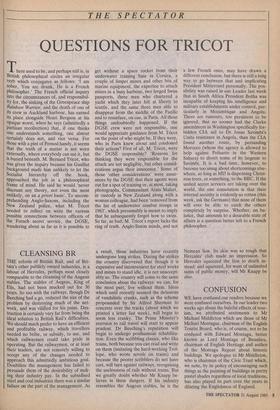THE SPECTATOR
QUESTIONS FOR TRICOT
There used to be, and perhaps still is, in British philosophical circles an irregular verb which conjugates as follows: 'I am sober, You are drunk, He is a French philosopher.' The French official inquiry into the circumstances of, and responsibil- ity for, the sinking of the Greenpeace ship Rainbow Warrior, and the death of one of its crew in Auckland harbour, has earned its place alongside Henri Bergson at his opaque worst, when he says (admittedly a partisan recollection) that, if one thinks one understands something, one almost certainly does not, and vice versa. For those with a pint of Pernod handy, it seems that the truth of a matter is not worn externally, where everybody can see it, but is buried beneath. M. Bernard Tricot, who was given the inquiry because his Gaullist background made him unlikely to let the Socialist hierarchy off the hook, approached the job in a philosophical frame of mind. He said he would 'never discount any theory, not even the most unlikely, on an a priori basis'. To uncom- prehending Anglo-Saxons, including the New Zealand police, what M. Tricot needed to reflect on were the various Possible connections between officers of the French secret service, the DGSE, wandering about as far as it is possible to get without a space rocket from their underwater training base in Corsica, a couple of limpet mines and other bits of marine equipment, the expertise to attach mines in a busy harbour, two forged Swiss passports, three men who chartered a yacht which they later felt at liberty to scuttle, and the same three men able to disappear from the middle of the Pacific and to resurface, on cue, in Paris. All these things undoubtedly happened. If the DGSE crew were not responsible, one would appreciate guidance from M. Tricot on the point of who might be. If they were, who in Paris knew about and condoned their actions? First of all, M. Tricot, were the DGSE responsible? 'Reasons for thinking they were responsible for the attack are not negligible, but other consid- erations argue their innocence.' Some of those 'other considerations' were assur- ances by the DGSE that their agents were out for a spot of training or, at most, taking photographs. Commandant Alain Mafart, in custody in New Zealand along with a woman colleague, had been 'removed from the list of underwater combat troops in 1983', which presumably is meant to imply that he subsequently forgot how to swim. So far, so bad; M. Tricot's report lacks the ring of truth. Anglo-Saxon minds, and not a few French ones, may have drawn a different conclusion, but there is still a long way to go between that and implicating President Mitterrand personally. The pos- sibility was raised in our Leader, last week that in South Africa President Botha was incapable of keeping his intelligence and military establishments under control, par- ticularly in Mozambique and Angola. There are rumours, too persistent to be ignored, that no sooner had the Clarke amendment in Washington specifically for- bidden CIA aid to Dr Jonas Savimbi's Unita resistance in Angola, than the CIA found another route, by persuading Morocco (whom the agency is allowed to help against Polisario in the Western Sahara) to divert some of its largesse to Savimbi. It is a bad time, however, to become too smug about shortcomings else- where, so long as MI5 is dispensing Christ- mas trees, or something, to the BBC. If the united secret services are taking over the world, the one consolation is that their internal security is evidently so rotten (this week, ask the Germans) that none of them will ever be able to catch the others completely by surprise. Whether, on ba- lance, that amounts to a desirable state of affairs is a question better left to a French philosopher.'










































 Previous page
Previous page